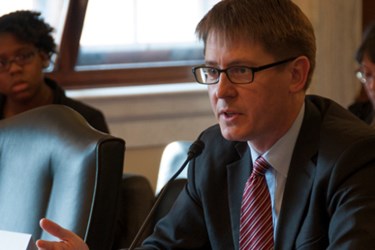FDA Works With China To Ensure Medical-Product Safety

By Christopher Hickey, Ph.D., FDA Country Director for the People’s Republic of China
Americans benefit greatly from medical products produced by other countries. Approximately 40 percent of finished drugs in the United States come from overseas, as well as more than 50 percent of all medical devices. About 80 percent of the manufacturers of active pharmaceutical ingredients are located outside the United States.
However, this rapid globalization of commerce presents challenges to regulators who oversee the safety and quality of medical products. Many of these challenges manifest themselves in China. As FDA’s country director for the People’s Republic of China, I testified on April 3, 2014 before the U.S.-China Economic and Security Review Commission, an advisory panel created by Congress, on our work to ensure the safety and quality of medical products produced in China and imported into the United States.
China is the source of a large and growing volume of imported foods, medical products and ingredients. In the years spanning fiscal years 2007 and 2013, the total number of shipments of FDA-regulated products from China to the United States almost quadrupled.
The challenges we see in China mirror those we see in other countries with developing regulatory systems. These issues include problems with data integrity, inadequate implementation of quality systems in manufacturing, and inconsistent regulatory oversight, among others.
As China’s role on the global stage expands, FDA has significantly increased drug and medical device inspections there, but we need to continue to strengthen our efforts. FDA is currently working to use Congressionally-appropriated funding to increase from eight to 27 the number of U.S. staff it posts in China. Visa issues that arose with the Chinese government over new FDA staff assigned there were addressed during Vice President Joe Biden’s visit to Beijing in December, and FDA continues its work to post new staff in Beijing in the coming months.
FDA recognizes that strategic engagement in China starts first and foremost with Chinese regulators. China’s Food and Drug Administration, or CFDA, is responsible for the regulation of food, drugs, and devices for domestic distribution in China, and for regulation of certain exported drugs and medical devices.
FDA has established a strong working relationship with CFDA. Our office has trained hundreds of Chinese inspectors in areas that include inspecting for good manufacturing practices and assessing the quality of data from sites that conduct clinical trials. Experts from FDA’s Center for Devices and Radiological Health now meet regularly with their counterparts from CFDA under the auspices of the International Medical Devices Regulatory Forum. These investments will pay long-term dividends for the American people: a stronger Chinese regulatory system can only strengthen FDA’s efforts to promote and protect U.S. public health.
Finally, in the area of inspections and enforcement, CFDA inspectors now regularly observe FDA inspections in China. And since 2012, FDA’s Office of Criminal Investigations has worked closely with CFDA to fight against Internet-based, illegal distribution into the U.S. of falsified, counterfeit and adulterated drugs.
FDA’s priorities in China match its global priorities: we work to ensure the safety and efficacy of FDA-regulated products. Manufacturers are best situated to make certain that appropriate processes are in place to ensure safety and quality in production. Regulatory bodies should hold companies accountable for lapses in the production process. Inspections and testing are important tools in that process, but they must be used as part of a larger system that emphasizes a preventive, approach to the production of safe, effective, high-quality medical products.
And in our globalized world, it’s increasingly important that regulatory partners work together to ensure the safety of products as they move through increasingly complex supply chains. Patients and consumers – whether in Beijing or Boston – deserve no less.
This blog post originally appeared on FDA Voice, the FDA's official blog brought to you from FDA's senior leadership and staff stationed at home and abroad — sharing news, background, announcements and other information about the work done at the FDA on behalf of the American public.
